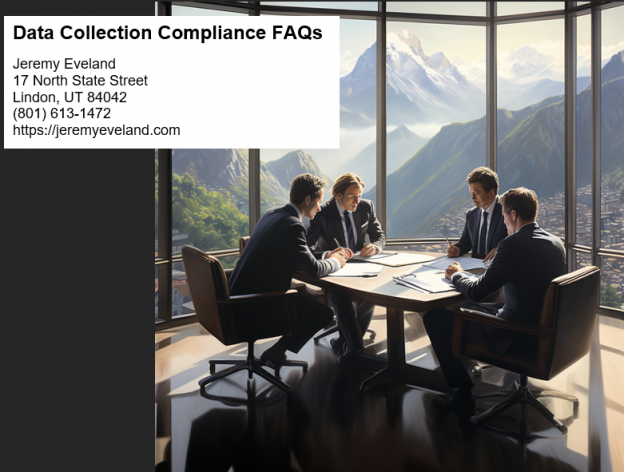In today’s digital age, data collection has become an integral part of running a successful business. However, with the increasing prevalence of data breaches and privacy concerns, it is crucial for companies to understand and comply with data collection regulations. This article aims to provide comprehensive answers to frequently asked questions about data collection compliance. By addressing common concerns and providing clear guidance, we aim to equip business owners and leaders with the knowledge they need to navigate the complex landscape of data collection laws and regulations.

What is data collection compliance?
Data collection compliance refers to the legal and ethical practices that businesses must adhere to when collecting, storing, and processing personal data. It ensures that businesses handle personal information securely, respect individuals’ privacy rights, and comply with applicable laws and regulations.
Compliance involves implementing policies, procedures, and safeguards to protect personal data from unauthorized access, use, or disclosure. It also requires obtaining individuals’ consent for data collection, providing transparency about the purpose and scope of data collection, and allowing individuals to exercise their rights regarding their personal information.
Why is data collection compliance important?
Data collection compliance is important for several reasons. Firstly, it helps protect individuals’ privacy rights and allows them to maintain control over their personal information. By adhering to data collection compliance, businesses demonstrate their commitment to respecting individuals’ privacy and building trust with their customers.
Secondly, data collection compliance helps businesses mitigate legal and financial risks. Non-compliance with data protection laws can result in severe consequences, including hefty fines and reputational damage. By implementing robust data collection compliance measures, businesses can avoid legal penalties and protect their reputation.
Lastly, data collection compliance is crucial for maintaining a competitive edge. As individuals become more aware of their privacy rights and demand greater control over their personal data, businesses that prioritize compliance are more likely to attract and retain customers. Compliance also enables businesses to access global markets by meeting the requirements of international data protection laws.

What laws regulate data collection compliance?
Various laws and regulations govern data collection compliance, both at the national and international levels. Here are two significant regulations that businesses need to consider:
General Data Protection Regulation (GDPR)
The GDPR is a comprehensive data protection regulation that applies to businesses operating within the European Union (EU) or processing data of EU residents. It sets out strict requirements for businesses collecting and processing personal data, such as obtaining explicit consent, implementing data protection measures, and allowing individuals to exercise their rights.
The GDPR grants individuals several rights, including the right to access their personal data, the right to rectify inaccurate information, the right to erasure, and the right to restrict processing. Non-compliance with the GDPR can result in fines of up to €20 million or 4% of the annual global turnover, whichever is higher.
California Consumer Privacy Act (CCPA)
The CCPA is a state-level privacy law that applies to businesses that collect, process, or sell personal information of California residents. It gives consumers greater control over their personal data by allowing them to request access to their information, opt-out of its sale, and request its deletion.
The CCPA also imposes obligations on businesses, such as providing clear and transparent privacy notices, implementing security measures to protect personal data, and giving consumers the right to opt-out of the sale of their information. Non-compliance with the CCPA can result in substantial fines and potential legal repercussions.
What are the consequences of non-compliance?
Non-compliance with data collection regulations can have significant consequences for businesses. Here are some of the potential outcomes of failing to comply with data collection requirements:
Fines and Penalties
Regulatory authorities have the power to impose substantial fines for non-compliance with data protection laws. These fines can vary depending on the severity of the violation and the regulatory authority involved. For example, under the GDPR, fines can reach up to €20 million or 4% of the annual global turnover, whichever is higher.
Reputational Damage
Non-compliance can lead to reputational damage, which can have far-reaching consequences for a business. News of privacy breaches or data mishandling can erode customer trust and loyalty, resulting in a loss of business and damaged brand reputation. Rebuilding trust after a breach can be a challenging and costly process.
Data Breaches
Data breaches can occur due to poor data protection practices, inadequate security measures, or human error. A data breach can lead to unauthorized access, use, or disclosure of personal information, resulting in potential harm to individuals and legal repercussions for the business. Data breaches can also expose businesses to civil lawsuits, regulatory investigations, and fines.

FAQs
FAQ 1: What is the difference between data collection compliance and data protection?
Data collection compliance refers to the legal and ethical practices that businesses must follow when collecting and processing personal data. It includes obtaining consent, providing transparency, and respecting individuals’ privacy rights.
Data protection, on the other hand, encompasses a broader range of measures aimed at safeguarding personal data from unauthorized access, use, or disclosure. It includes implementing security measures, controlling access to data, and adopting policies and procedures to ensure data confidentiality and integrity.
FAQ 2: Do businesses need consent to collect personal data for compliance?
Yes, in most cases, businesses need individuals’ consent to collect their personal data for compliance purposes. Consent is a fundamental principle of data protection laws and ensures that individuals are aware of and agree to the collection, processing, and storage of their data.
However, consent must be freely given, specific, informed, and unambiguous. Businesses must clearly explain the purpose and scope of data collection and allow individuals to withdraw their consent at any time. It is essential to obtain valid consent and document it appropriately to demonstrate compliance.
FAQ 3: How can businesses handle data breaches effectively?
Handling data breaches effectively requires a proactive and well-prepared approach. Businesses should have an incident response plan in place that outlines the steps to be taken in the event of a breach. These steps may include:
-
Identifying and containing the breach: Businesses should promptly detect and contain the breach to minimize its impact and prevent further unauthorized access.
-
Assessing the impact: Conducting a thorough investigation to determine the extent of the breach, the data affected, and the potential risks to individuals.
-
Notifying individuals and authorities: Depending on the severity of the breach and applicable laws, businesses may need to notify affected individuals and regulatory authorities within the specified timeframes.
-
Mitigating harm: Taking appropriate steps to mitigate the potential harm to individuals, such as providing credit monitoring services or offering support to affected individuals.
-
Learning from the incident: Conducting a post-incident review to identify areas of improvement, updating security measures, and reinforcing data protection policies and procedures.
FAQ 4: Are there any exemptions from data collection compliance?
Data protection laws may provide certain exemptions or exceptions to data collection compliance under specific circumstances. These exemptions are often limited and subject to strict conditions.
For example, some laws may have exemptions for data processed for journalistic purposes, research, or archiving purposes in the public interest. However, even in these cases, businesses must ensure that they balance the exemption with the privacy rights and interests of individuals and comply with all other applicable data protection requirements.
FAQ 5: Can individuals request the deletion of their personal data?
Yes, individuals generally have the right to request the deletion of their personal data under data protection laws such as the GDPR and CCPA. This right is often referred to as the “right to be forgotten” or the “right to erasure.”
Businesses must have procedures in place to handle such requests promptly. However, this right is not absolute and may be subject to certain conditions or exceptions, such as when data retention is necessary for legal or legitimate business purposes.
In conclusion, data collection compliance is crucial for businesses to protect individuals’ privacy rights, mitigate legal and financial risks, and maintain a competitive advantage. By understanding and complying with the relevant laws and regulations, businesses can ensure the responsible and ethical handling of personal data, fostering trust and loyalty among their customers.
Legal Consultation
When you need help from a lawyer call attorney Jeremy D. Eveland, MBA, JD (801) 613-1472 for a consultation.
Jeremy Eveland
17 North State Street
Lindon UT 84042
(801) 613-1472
